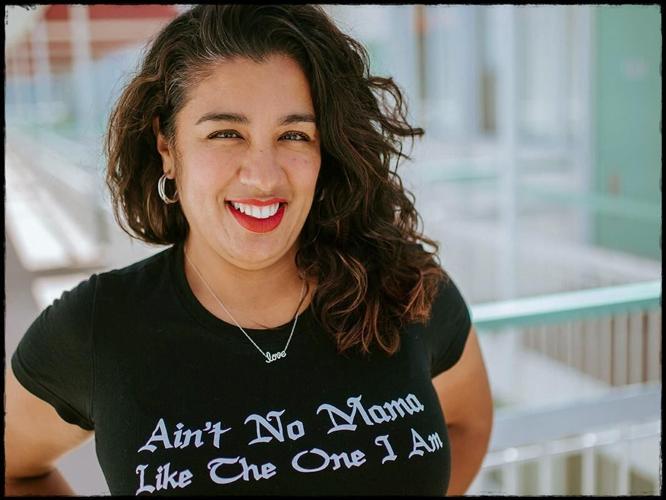Dr. Susana Marquez is a specialized maternal mental health clinician. She educates mothers on what maternal mental health is and helps their family members understand what these mothers are experiencing during pregnancy. She educates on the importance of the mother’s mental and emotional well-being by connecting them with the proper resources in the community. Dr. Marquez is also a health advocate, speaker, and educator in the Latino community. Dr. Marquez is a licensed marriage and family therapist and her services include therapy, support groups, workshops and classes for women during pregnancy, postpartum and parenthood.
The three pillars of her work focus on mental, emotional and spiritual wellness. She focuses on these pillars because she believes they are the key components of her journey toward healing, growth and becoming a healthier mother and woman. Dr. Marquez helps mothers take control of their mental and emotional well-being through their darkest and most challenging moments. With empathy and understanding, she helps them heal and grow into better versions of themselves while knowing the value within them.
Dr. Marquez earned her master’s and doctorate in Marriage and Family Therapy from Alliant International University in Irvine, CA. She is a member of the California Association of Marriage and Family Therapy (CAMFT) and also an active member of Postpartum Support International (PSI) she is a support coordinator for Los Angeles and Orange County in Southern California. Additionally, she has obtained a certificate in bringing light to motherhood through Maternal Mental Health NOW in LA.
Educating the Latina community about maternal mental health is a step in the right direction, Dr. Marquez says.
Responses have been edited for clarity and brevity.

DR. SUSANA MARQUEZ, 42, LOS ANGELES, SPECIALIZED MATERNAL MENTAL HEALTH CLINICIAN, CENTRAL AMERICAN, SHE/HER/ELLA
WHAT IS MATERNAL MENTAL HEALTH?
Maternal mental health basically encompasses the mental and emotional well-being of the mother, during pregnancy and after. The signs that we are looking for are her moods, her behavior, how she’s feeling, and how she’s thinking. Maternal mental health is also how the mom is doing with herself and how her mental and emotional well-being after the baby is here is doing when there are a lot of things that are changing.
WHY IS MATERNAL MENTAL HEALTH IMPORTANT FOR LATINAS?
It’s really important because we have established and perpetuated the ideology that mothers’ needs and well-being don’t matter. We never take a look at how that mother is doing. When the baby is doing well, we assume everything is good with the mother, too, but we never really ask for the mother’s well-being. Is mom sleeping? Is mom eating something? Is the mother taking care of herself? Does mom have a support system? So, it’s important in our community because as Latinas as a culture and the practice of Catholicism, mothers’ needs and mental well-being are put on the back burners and are not prioritized. So, we have mothers who are suffering in silence, mothers who are very depressed and sad and are not asking for help. A lot of the time, these cases can be prevented.
Recently, in the last couple of years, there have been more cases in the Latina community where mothers have harmed their children and taken their children’s lives. Then we come to find out that there have been open cases with the Department of Child and Family Services where those cases have just [fallen] into the crack and those situations are the ones making it on to the news, where we see a mother murdering her baby. So, in our community, because mental and emotional help is a topic that is very taboo, we really don’t have that conversation. We need to educate others in our community that our mental health is important to talk about because a mother’s mental health state is going to change with pregnancy and with postpartum. We also need to educate the family to be a better support system around her and educate them on what postpartum looks like. It’s basically like a domino effect where everyone is learning and understanding what the process is. We need to understand what the mother is needing and how the mother can ask for what she needs without feeling judged, dismissed, or blamed. We need to break from the stigma, break from those taboos and create a better place for mothers who can feel supported and feel heard. Unfortunately, our system and our society don’t support mothers because employers don’t support us and we also don’t have the proper health care, or the proper maternity leave and the proper child care system in place.
HOW DOES PREGNANCY AFFECT YOUR MENTAL HEALTH?
There are a lot of hormonal changes and there are a lot of thoughts about what kind of mother you’re going to be. There’s a lot of fear and a lot of anxiety, especially if you’re a first-time mom. There are also a lot of body changes, so you’re also experiencing physical changes that lead you to feel that you don’t look as great as you would like to look. We also have to accept and adjust to the new changes, so it’s a physical and mental process. Sometimes the pregnancy is high-risk and a mother might feel she is not going to be a competent mother because she thinks she did something wrong to cause those health issues in herself or the baby. Mentally, you’re struggling to adapt to the new, which is very different.
Pregnancy will affect our thoughts and our feelings and it will bring on a wave of emotions that we have never experienced in our lives and every pregnancy is different. Sometimes the first baby is a breeze and then the second one is the challenging one, or vice versa. It is important to address mental health because just like anything that may be happening to you physically, the mind has to process and adapt to the new changes and environment.
WHAT FACTORS MAY CONTRIBUTE TO MATERNAL MENTAL HEALTH IN LATINAS? AND WHAT ARE SOME SIGNS TO LOOK OUT FOR?
Well we have to look at socioeconomic status and the kind of support system that the mother has. We have to assist her stressors and what they are. Many of the times it’s her job, a family member, her partner, or just looking into her relationship overall. Each mom can have a different situation. She can be in a bad relationship, she can be a single mom, she can have immiration issues or even healthcare or housing. There’s a lot to consider when working with a pregnant Latina. Some of the signs to look out for are isolation, intrusive thoughts, constant crying, being irritable, [or being] frustrated or can’t communicate. There are so many signs but the most important ones to look out for would be the mom being in danger with herself or the baby. It’s always good to ask the mom questions so that she feels that she’s in a safe place to ask for what she needs.
WHAT ARE THE RISKS TO THE MOTHER AND THE BABY ASSOCIATED WITH PERINATAL MENTAL HEALTH PROBLEMS?
The risk for the mother is that she could have a hard time bonding with the baby. Most of the time, a mom can feel guilty if she’s not having that connection with her baby because she might feel that it’s the baby’s fault that she’s feeling that way.
If she doesn’t have the right support system, she may feel really alone with the baby, so there might be a lot of thoughts and regrets depending on the situation. Many mothers do not reject the baby on purpose; rather, they do so because they do not believe they are confident or capable of doing so. A lot of mothers feel like they’re not going to be good enough for their babies, so there’s not a strong connection.
Sometimes the mother intends to breastfeed but, for whatever reason, fails to do so. There is also the difficult detachment and lack of confidence that comes with being a new mother. We need to understand that if there is the right support system in place, the mother can overcome the challenges and can overcome those intrusive thoughts. On the other hand, if the mom has way too many stressors going on and she finds herself with the baby, that can only perpetuate a very unhealthy ambition cycle, which would take longer to address and would make it harder for the baby and the mother to create that connection.
HOW IS PERINATAL MENTAL HEALTH TREATED?
There are different factors and different ways of treating them. It can be done through medication. It can be a combination of medication and individual therapy. They may also need a support group, family therapy, or couples therapy. There are also different forms of physical healing, like support circles. There are many ways of treating, but for the most part, I learned professionally that when there’s more than one thing in place, it’s more beneficial to the mother. Sometimes moms need to try things and see what works for them and their families. It’s all based on the mother’s needs.
WHAT ADVICE WOULD YOU GIVE TO A MOTHER WHO IS AFRAID TO ASK FOR HELP?
I would definitely say to reach out to whoever her biggest support system is. The mother needs to reach out and say, “I need help,” and it’s OK, because asking for help is a trait of strength. Recognizing that we need help is perfectly acceptable. So, whoever it is, a friend, family member, extended family member, or a church person, or even calling a hotline is OK. I am a part of Postpartum Support International, so they can call the hotline and ask for help and they will connect them with a coordinator. I’m the coordinator for LA County and Orange County, and in that case, I would connect you with the services that they might need. Sometimes asking for help is a phone call away or even a text message away to receive those services and you don’t have to feel ashamed or judged, but the first step is acknowledging you need help and knowing more than anything that you are not alone.
99.9% of us moms, and I leave that 1% out because some moms will say they had the perfect pregnancy or the perfect labor, which leads me to say as a professional and a mother there is nothing perfect in this world. So 99.9% of us moms, regardless of how old our kids are, we are losing our minds and need help, especially in the last three years with the COVID-19 pandemic. Things have definitely spiked, there has been a bigger increase in services in mother’s and even father’s calling the hotline and asking for help.










(0) comments
Welcome to the discussion.
Log In
Keep it Clean. Please avoid obscene, vulgar, lewd, racist or sexually-oriented language.
PLEASE TURN OFF YOUR CAPS LOCK.
Don't Threaten. Threats of harming another person will not be tolerated.
Be Truthful. Don't knowingly lie about anyone or anything.
Be Nice. No racism, sexism or any sort of -ism that is degrading to another person.
Be Proactive. Use the 'Report' link on each comment to let us know of abusive posts.
Share with Us. We'd love to hear eyewitness accounts, the history behind an article.